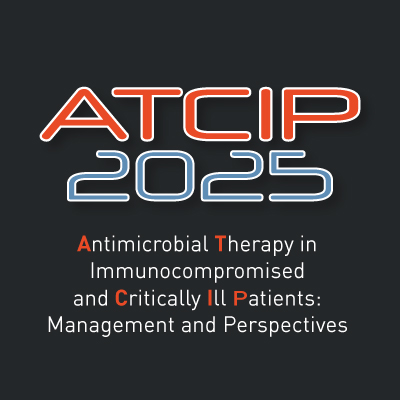


 Registrations close on 09/05/2025
Registrations close on 09/05/2025
Date and time
TITLE
ATCIP 2025
In-person Virtual
ATCIP 2025
In-person Virtual
ATCIP 2025
In-person Virtual
ATCIP 2025
In-person Virtual
ATCIP 2025
In-person Virtual
Critically ill patients are at increased risk of developing severe and often fatal infections and infectious complications. A large investment of financial and medical resources has improved outcomes, but the optimal treatment options for these patients are still matter of discussions among the experts. Infections, sepsis, and septic shock are leading causes of morbidity and mortality in the intensive care unit (ICU), and physicians dedicate many resources to their revention, diagnosis, and therapy, as well as to the evaluation of the treatment outcomes. Improvement in the management of infections in critically ill patients at high risk for complications, and decrease of adverse outcomes, will most likely be the results of better quality of care, the development of new models to evaluate outcomes data, questioning and revising currently accepted standards of care, the implementation of new ideas and the performance of innovative linical trials, and a paradigm shift in the treatment procedures, considering that the slow pace observed in the development of new, effective antibiotics cannot be the driving force of progress. The fast advances in the development of mathematical models evaluating infectious processes, including genetics as well as statistical and artificial intelligence modelling, are also key to a reliable evaluation of causes and therapeutic approaches, ultimately improving outcomes of infectious disease. With a focus on practical aspects, the seventh congress on Antimicrobial Therapy in Immunocompromised and Critically Ill Patients (ATCIP) will review the latest advances in the epidemiology, diagnosis, and therapy of infections in immunocompromised and critically ill patients. Experts will provide an updated insight in the research and therapy of infectious diseases during plenary sessions and an interactive session. Advances in clinical mycology, as well as the progress in the epidemiology, diagnosis, and therapy of infectious concomitant diseases in solid organ transplanted (SOT) patients will be discussed. A session will be dedicated to the use of new vaccines in immunocompromised patients and the infectious complications of cellular treatments in oncology. Experts will also discuss the use of new antivirals and other therapies in Hepatitis B and D as well as the use of ART in HIV. Infectious disease in the ICU will also have a prominent role, with talks reviewing the importance of sinks, the opportunities and obstacles associated with the use of AI, and the implementation of the new FUNGINOS aspergillosis guidelines in the ICU. The programme will be completed with satellite symposia discussing recent advances in the development of new drugs and treatment options. Overall, the congress promises to become not only an exciting opportunity to learn from internationally known experts, but also to be an important networking platform that will allow clinical practitioners to interact with leading researchers in the infectious diseases field.